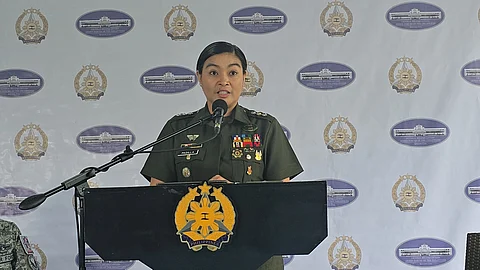
- NEWS
- the EDIT
- COMMENTARY
- BUSINESS
- LIFE
- SHOW
- ACTION
- GLOBAL GOALS
- SNAPS
- DYARYO TIRADA
- MORE

The Armed Forces of the Philippines (AFP) has officially recognized cybersecurity as the fourth domain of operations, expanding the battlefield beyond land, air, and sea.
AFP Spokesperson Col. Francel Padilla confirmed the development after President Ferdinand "Bongbong" Marcos Jr. stated that modern warfare now includes cyberspace, with threats extending beyond traditional conflicts.
Padilla emphasized that the growing challenges in the cyber domain, particularly misinformation, disinformation, and malinformation, are now central to national security concerns. She pointed out that cyber actors, both foreign and local, manipulate narratives to destabilize the country.
"We are seeing news reports that are not from legitimate sources. People keep sharing and spreading them, proliferating fake news without verification," Padilla said in a DZRH interview.
Despite online chaos, Padilla reassured that the country remains stable, with peaceful rallies and a calm real-world situation.
"Our country remains stable. Even our rallies, which are mostly prayer rallies, are generally peaceful," she said, noting that the cyberspace is now chaotic more than real life.
The AFP’s cybersecurity concerns align with the National Bureau of Investigation’s (NBI) intensified efforts to track down fake news spreaders.
NBI Director Jaime Santiago revealed that the agency is working closely with Facebook and TikTok to identify vloggers and influencers spreading false information.
"We had a vlogger’s post taken down, only to find that they had multiple accounts. We are now working to remove them one by one," Santiago said The NBI has identified 20 vloggers, with their posts under investigation.
While emphasizing the importance of free speech, Santiago clarified that this right does not extend to deliberately spreading falsehoods.
"If what you are saying is fake news, it falls under our laws. We assess and balance this because citizens and journalists have the right to comment on current events — but not to distort facts or commit libel," he explained.
On March 21, the NBI arrested vlogger Wendelyn Magalso for allegedly altering a statement from President Marcos Jr. to falsely suggest he supported drug legalization.
Magalso, who admitted to spreading fake news for profit, now faces charges under the Cybercrime Prevention Act and the Revised Penal Code, which could lead to up to six years in prison and a fine of ₱200,000.
"Vloggers who manipulate statements will be targeted. Facebook and TikTok are cooperating to remove such content," Santiago warned.
